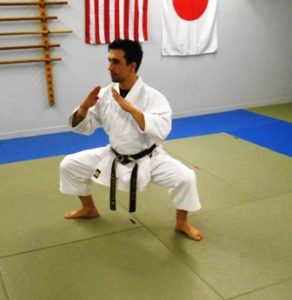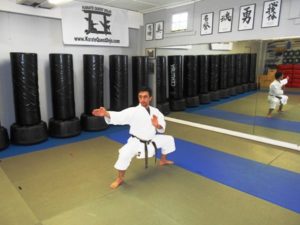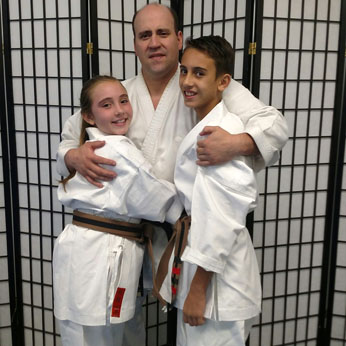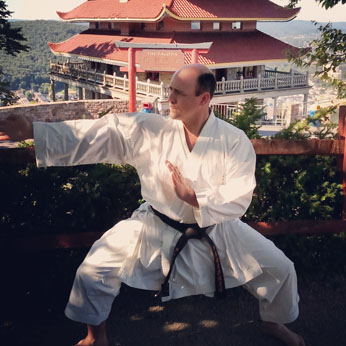 Functionally translated, karate-do means “empty hand way of self-defense.” The word “way” can be interpreted in many ways but usually indicates a constant striving for attainment of understanding of oneself, about others, about martial arts, and about living in harmony with others.
Functionally translated, karate-do means “empty hand way of self-defense.” The word “way” can be interpreted in many ways but usually indicates a constant striving for attainment of understanding of oneself, about others, about martial arts, and about living in harmony with others.
Karate Quest Dojo is a dojo (training hall) which provides traditional training in the ancient ways of Okinawa Goju-Ryu Karate-Do (Okinawa “hard and gentle style” of karate.)
The Goju-Ryu style was created from the life long work of two great Okinawan karate teachers, Kanryo Higashiona (1853-1917) and his student Chojun Miyagi (1888-1953.) Since the style was developed on Okinawa and in China, it reflects a blend of techniques from such martial arts as Okinawa-te and several kung-fu styles. As a result this style contains a variety of techniques, ranging from powerful and explosive punches and kicks to more subtle and gentle blocking and evading techniques.
 The physical training of Goju-Ryu is rigorous, with an emphasis on strength, endurance, flexibility, speed, and breath control. To properly prepare for the training there are exercises for warming-up, stretching, conditioning, strengthening, toughening and breathing. On another level there are many techniques for standing, blocking, punching, striking, kicking, restraining, throwing, falling, rolling, shifting and evading. These are assembled into a series of more advanced level techniques known as kata (formal exercises.)
The physical training of Goju-Ryu is rigorous, with an emphasis on strength, endurance, flexibility, speed, and breath control. To properly prepare for the training there are exercises for warming-up, stretching, conditioning, strengthening, toughening and breathing. On another level there are many techniques for standing, blocking, punching, striking, kicking, restraining, throwing, falling, rolling, shifting and evading. These are assembled into a series of more advanced level techniques known as kata (formal exercises.)
Various types of kumite (sparring) drills are also practices, some cooperative, some competitive. Kumite exercises are very structured in the introductory stages.
The technical heritage is supplemented by the presence of cultural elements derived from centuries of blending of Eastern philosophies. For centuries these philosophies were passed with an oral tradition down from teacher to student along with the self-defense skills. The transmission of these philosophies are important to ensure that karate exists as being much more that just fighting skills. The ancient masters were insistent upon making karate an art that would build society up, not tear it down.
The philosophy of Okinawa Goju-Ryu Karate-Do is best summarized by its code of ethics, known as “Dojo Kun”:
Be humble and polite
Train considering your physical strength
Practice earnestly with creativity
Be calm and swift
Take care of your health
Live a plain life
Do not be too proud or modest
Continue your training with patience
Thank you for reading. See you in class!






